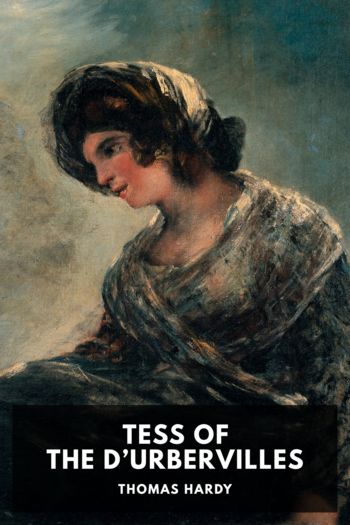Far from the Madding Crowd - Thomas Hardy (intellectual books to read .txt) 📗

- Author: Thomas Hardy
Book online «Far from the Madding Crowd - Thomas Hardy (intellectual books to read .txt) 📗». Author Thomas Hardy
Holding to the rails, she advanced, thrusting one hand forward upon the rail, then the other, then leaning over it whilst she dragged her feet on beneath.
This woman was not given to soliloquy; but extremity of feeling lessens the individuality of the weak, as it increases that of the strong. She said again in the same tone, “I’ll believe that the end lies five posts forward, and no further, and so get strength to pass them.”
This was a practical application of the principle that a half-feigned and fictitious faith is better than no faith at all.
She passed five posts and held on to the fifth.
“I’ll pass five more by believing my longed-for spot is at the next fifth. I can do it.”
She passed five more.
“It lies only five further.”
She passed five more.
“But it is five further.”
She passed them.
“That stone bridge is the end of my journey,” she said, when the bridge over the Froom was in view.
She crawled to the bridge. During the effort each breath of the woman went into the air as if never to return again.
“Now for the truth of the matter,” she said, sitting down. “The truth is, that I have less than half a mile.” Self-beguilement with what she had known all the time to be false had given her strength to come over half a mile that she would have been powerless to face in the lump. The artifice showed that the woman, by some mysterious intuition, had grasped the paradoxical truth that blindness may operate more vigorously than prescience, and the short-sighted effect more than the far-seeing; that limitation, and not comprehensiveness, is needed for striking a blow.
The half-mile stood now before the sick and weary woman like a stolid Juggernaut. It was an impassive King of her world. The road here ran across Durnover Moor, open to the road on either side. She surveyed the wide space, the lights, herself, sighed, and lay down against a guard-stone of the bridge.
Never was ingenuity exercised so sorely as the traveller here exercised hers. Every conceivable aid, method, stratagem, mechanism, by which these last desperate eight hundred yards could be overpassed by a human being unperceived, was revolved in her busy brain, and dismissed as impracticable. She thought of sticks, wheels, crawling—she even thought of rolling. But the exertion demanded by either of these latter two was greater than to walk erect. The faculty of contrivance was worn out. Hopelessness had come at last.
“No further!” she whispered, and closed her eyes.
From the stripe of shadow on the opposite side of the bridge a portion of shade seemed to detach itself and move into isolation upon the pale white of the road. It glided noiselessly towards the recumbent woman.
She became conscious of something touching her hand; it was softness and it was warmth. She opened her eyes, and the substance touched her face. A dog was licking her cheek.
He was a huge, heavy, and quiet creature, standing darkly against the low horizon, and at least two feet higher than the present position of her eyes. Whether Newfoundland, mastiff, bloodhound, or whatnot, it was impossible to say. He seemed to be of too strange and mysterious a nature to belong to any variety among those of popular nomenclature. Being thus assignable to no breed, he was the ideal embodiment of canine greatness—a generalization from what was common to all. Night, in its sad, solemn, and benevolent aspect, apart from its stealthy and cruel side, was personified in this form. Darkness endows the small and ordinary ones among mankind with poetical power, and even the suffering woman threw her idea into figure.
In her reclining position she looked up to him just as in earlier times she had, when standing, looked up to a man. The animal, who was as homeless as she, respectfully withdrew a step or two when the woman moved, and, seeing that she did not repulse him, he licked her hand again.
A thought moved within her like lightning. “Perhaps I can make use of him—I might do it then!”
She pointed in the direction of Casterbridge, and the dog seemed to misunderstand: he trotted on. Then, finding she could not follow, he came back and whined.
The ultimate and saddest singularity of woman’s effort and invention was reached when, with a quickened breathing, she rose to a stooping posture, and, resting her two little arms upon the shoulders of the dog, leant firmly thereon, and murmured stimulating words. Whilst she sorrowed in her heart she cheered with her voice, and what was stranger than that the strong should need encouragement from the weak was that cheerfulness should be so well stimulated by such utter dejection. Her friend moved forward slowly, and she with small mincing steps moved forward beside him, half her weight being thrown upon the animal. Sometimes she sank as she had sunk from walking erect, from the crutches, from the rails. The dog, who now thoroughly understood her desire and her incapacity, was frantic in his distress on these occasions; he would tug at her dress and run forward. She always called him back, and it was now to be observed that the woman listened for human sounds only to avoid them. It was evident that she had an object in keeping her presence on the road and her forlorn state unknown.
Their progress was necessarily very slow. They reached the bottom of the town, and the Casterbridge lamps lay before them like fallen Pleiads as they turned to the left into the dense shade of a deserted avenue of chestnuts, and so skirted the borough. Thus the town





Comments (0)